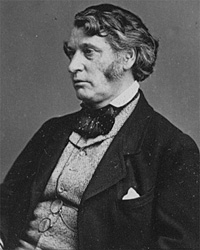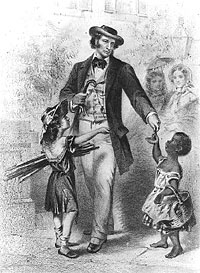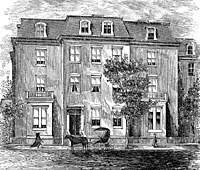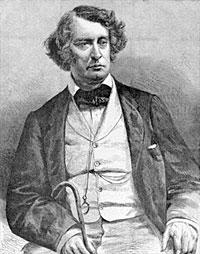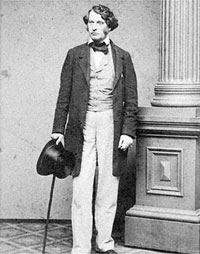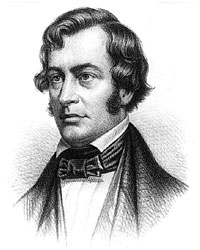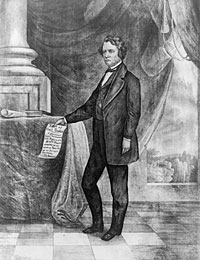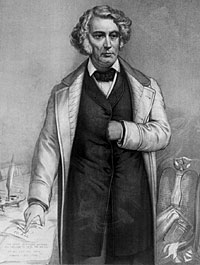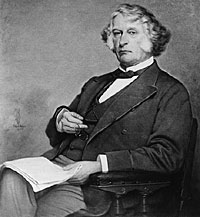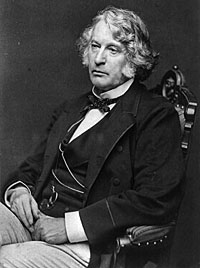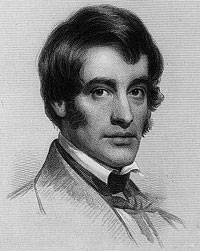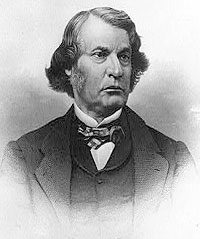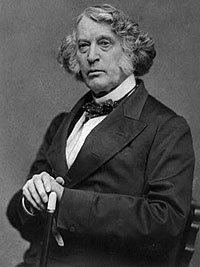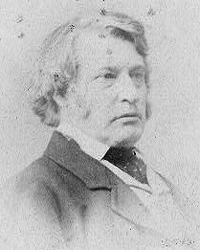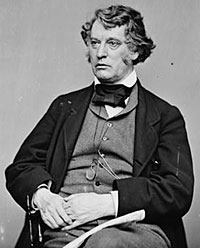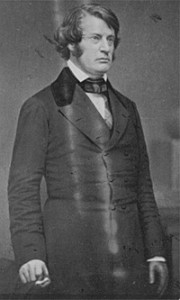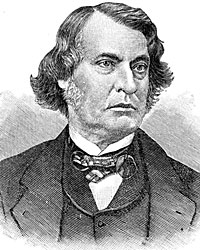President-elect Lincoln proposed comparing heights with a stiff-backed Senator Charles Sumner. Mr. Lincoln later recalled: “Sumner declined to stand up with me, back to back, to see which was the tallest man, and made a fine speech about being the time for uniting our fronts against the enemy and not our backs. But I guess he was afraid to measure, though he is a good piece of a man. I never had much to do with bishops where I live, but, do you know, Sumner is my idea of a bishop.”1 Nevertheless, the two opponents of slavery soon found reasons to work back to back.
On December 1, 1861, President Lincoln met with Senator Charles Sumner regarding the Trent affair and emancipation. Sumner told Mr. Lincoln: “Now, Mr. President, if you had done your duty earlier in the slavery matter, you would not have this trouble on you. Now you have no friends, or the country has none, because it has no policy upon slavery. The country has no friends in Europe, excepting isolated persons. England is not a friend. France is not. But if you had commenced your policy about slavery, this thing could and would have come and gone and would have given you no anxiety….”2
“By the time Congress reassembled in December [1861], Sumner was confident that further blows against slavery were in the offing. Early in the session he and the President had a long discussion of emancipation, and Lincoln told him: ‘Well, Mr. Sumner the only difference between you and me on this subject is a difference of a month or six weeks in time.,'” wrote David Donald, who authored biographies of both Sumner and President Lincoln. “‘Mr. President,’ replied Sumner, ‘if that is the only difference between us, I will not say another word to you about it till the longest time you name has passed by.'”3 Sumner wrote Massachusetts Governor John Andrew that “He tells me that I am head of him only a month or six weeks.”4
Massachusetts Senator Charles Sumner “was a theorist, agitator, and rhetorician, a doctrinaire who lacked insight into the men he attacked and the measures he discussed, and an egotist who let vanity override common sense. He was so intolerant that he regarded a difference of opinion on any subject as a moral delinquency. Once he let his emotions seize control of him, his voice vibrated in a tremulous rumble, he coined magniloquent phrases, he laid down the law, and he made opponents instead of friends,” wrote historian Allan Nevins.5 “Stevens may be described as an agitator, Lincoln as a harmonizer. Both types are indispensable in our democratic system,” wrote biographer Richard Nelson Current.6
Although Sumner wavered in the faith he reposed in President Lincoln, the President found solace in the support he received from Senator Sumner. David Donald wrote: “That President and Senator should agree upon so many basic issues was not surprising, for both men drew their political ideas from the same well. It was not until after Lincoln’s death, when Sumner had to restudy his speeches and letters in order to prepare a eulogy, that the Senator came to understand how much both their political philosophies derived from the Declaration of Independence.”7According to Donald, “Lincoln knew that the senator was the voice of a large, articulate element with great moral influence throughout the North; with Sumner at his side, the President could ignore the sniping from ultra-abolitionists.”8
According to Summer, President Lincoln’s “whole soul was occupied, especially by the first proposition, which was peculiarly his own. In familiar intercourse with him, I remember nothing more touching than the earnestness and completeness with which he embraces this idea. To his mind it was just and beneficent, while it promised the sure end of slavery.”9 Biographer Moorfield Storey wrote: “Though Sumner sometimes differed with the President on questions of policy, and was impatient with his deliberation, they were in essential harmony, and Sumner never lost his confidence in Lincoln. His feelings appear clearly in private letters written early in June, 1862, from which some passages may be quoted: –
“Your criticism of the President is hasty. I am confident, if you knew him as I do, you would not make it. Could you – as has been my privilege often – have seen the President while considering the great questions on which he has already acted,…even your zeal would be satisfied; for you would feel the sincerity of his purpose to do what he can to carry forward the principles of the Declaration of Independence.”10
Storey wrote: “Sumner felt that it was not safe to delay until the course of the war had educated the country up to emancipation, and that something should be done to create a public opinion upon which the President could lean. His opportunity came in an invitation to address the State Republican Convention of Massachusetts, and his speech on October 1, 1861, was the first public demand for emancipation made by any responsible statesman. After dwelling on the suffering and disasters caused by the civil war, and pointing out that all these were borne to preserve slavery, he proceeded: –
It is often said that war will make an end of slavery. This is probable. But it is surer still that the overthrow of slavery will make an end of the war.
If I am correct in this averment, which I believe beyond question, then do reason, justice, and policy unite, each and all, in declaring that the war must be brought to bear directly on the grand conspirator and omnipresent enemy. Not to do so is to take upon ourselves all the weakness of slavery, while we leave to the rebels its boasted resources of military strength….It is not necessary even, borrowing a family phrase, to carry the war into Africa. It will be enough if we carry Africa into the war.11
Charles Sumner was familiar with struggle. His twin sister died at age 21. He was the oldest of nine children. He was a social outcast among his peers and poured himself into books, teaching himself Latin. When he was a teenager, his father was appointed Sheriff of Suffolk County (Boston). He had trouble at Harvard because he had trouble with math. His nickname was “Chatterbox.” He continued at Harvard Law School where he worked much harder and Supreme Court Associate Justice Joseph Story became his mentor. He was a good scholar of the law but a lousy lawyer. He spent much of his time trying to qualify for a full-time post at Harvard Law School, where he occasionally lectured.
Sumner did, however, develop a talent for making acquaintances, famous acquaintances with political and literary elites– like Henry Wadsworth Longfellow. Indeed, the literary-intellectual elite of Massachusetts like Ralph Waldo Emerson were his most faithful supporters. In 1837, he decided to make a tour of Europe in order to broaden his knowledge of the law and enhance his prospects for a teaching position. His British friends, in particular, were useful to him over the next three decades. He traveled through England, France, and Italy and didn’t return to the U.S. until 1840.
Summer also developed a talent for acerbic criticism. He developed an interest in a number of social causes – public education, prisons, peace, and slavery. His positions managed to help polarize debate. Because of his insensitivity to the opinions of others, he made enemies – such as his denunciation of war in his “Grandeur of Nations” speech on July 4. According to Donald: “In all three reform movements the pattern of his participation was precisely the same. He started by holding the ideas most New Englanders shared. Through the influence of [William Ellery] Channing, his views on international peace, on prison discipline, and on slavery came to be more carefully thought out and more articulately expressed, but not until personal unhappiness increased Sumner’s sensitivity to social justice did he take an active part in agitating these issues. Once he appeared before the public, he was attacked, and the more he was criticized, the more inflexible his opinions became. Carrying his ideas to extremes, he alienated moderate opinion and placed himself, as George Ticknor announced, ‘outside the pale of society.'”12
Charles Francis Adams later observed that “Sumner is impulsive and ardent and this carried him perpetually to an extreme.” His friend Hilliard observed: “Sumner is so much occupied with thoughts of how the world is to be made better, that he does not pause to consider and observe what the world really is.”13 Hilliard also said: “His mind and character require the stimulus of something outward and exoteric, some strong pressure, to take him out of himself and prevent him from a morbid habit of inactive brooding. He is a man of moral enthusiasm; made to identify himself with some great Cause and accept and surrender himself to it unconditionally,” wrote biographer David H. Donald.14Having failed to win the approval of the Boston establishment, he decided to fight it.
Sumner “had stumbled into politics largely by accident. He rose to leadership in the Massachusetts Free Soil movement as much through the unavailability of his rivals as through his own talents and exertions. Candidate of a minority party, he was first chosen to the Senate through the devious workings of a political coalition. At nearly any point during his first five years in office, had he been up for re-election, he would almost certainly have been defeated. Then Preston Brook’s attack gave him his second term in the Senate and thereby assured him seniority and prestige within the Republican party. Never chosen by direct popular vote for any office, Sumner, by 1861, nevertheless had become one of the most powerful men in the United States,” wrote biographer David H. Donald.15
In 1846, conscience Whigs such as Charles Francis Adams, launched an attack on Cotton Whigs such as Robert Winthrop. Sumner was in the forefront of printed attacks on Winthrop. “…it is true that a whole series of personal disasters and professional failures during the early 1840’s had turned Sumner against the Boston society he once so admired.”16 In 1848, the Whigs of Massachusetts split apart among factions tied to Webster, the Conscience Whigs and those supporting General Zachary Taylor for President. The result was to alienate the Conscience Whigs from the rest of the party. That year, Sumner helped organize the Massachusetts Free Soil party.
When Robert Winthrop succeeded Webster in the Senate in 1850, Sumner was nominated for Congress and soundly defeated. Although publicly opposed to coalitions, he privately supported cooperation with the Democrats in the 1850 elections – in opposition to Charles Francis Adams who later said that Sumner showed “some want of character.” When the Whigs failed to get a majority of the state legislature, the Democrats and Free Soilers. A deal was hatched for the Democrats to get most of the state offices and the Free Soilers to get a six-year Senate seat. The coalition. It was difficult for either the Whigs or the Democrats to get complete unanimity; the opposition of Democrat Caleb Cushing thwarted Sumner’s ambitions. It took over three months – from January 23, 1851 to April 24, 1851 – and 26 ballots for Sumner to win election by a margin of one vote.
In and out of the Senate, Sumner was humorless and obstinate. When Seward asked him for a political favor, he told Seward that he had not been sent to the Senate to help reelect Seward. “Sumner, you’re a damned fool,” said Seward. The exchange was silly because Sumner voted for the bill in question. “After the Civil War, Nathaniel Banks said of Charles Sumner that he was ‘not a harmonizer.’ This was true of all the radicals, for they rejected a cardinal principles of American politics, that of compromise,” wrote historian Eric Foner.17
Although 1854 was good to Sumner politically – Everett resigned in frustration – it was bad for his coalition. Know-Nothings swept the state elections. Biographer David H. Donald wrote: “Both temperamentally and intellectually Sumner disliked this nativist movement, which he feared might ‘break up the whole Northern combination and…give the South another lease of national ascendency.’….But whatever he said in private, Sumner took great care not to offend the powerful new order. Recognizing that most Massachusetts antislavery men, and practically all his special political backers, were now Know-nothings, he refrained, even in private letters, from condemning its course.”18
Like Chase, Sumner was a good slogan maker but a bad coalition builder. In his “Crime Against Kansas” speech on May 19, 1855, Summer deliberately insulted Senator Butler of South Carolina as a man who “has chosen a mistress to whom he has made his vows, and who, though ugly to others, is always lovely to him; though polluted in the sight of the world, is chaste in his sight…the harlot, Slavery.” After he read the text of the speech, Butler’s nephew, Preston Brooks, decided he must be punished. He approached Sumner at his desk in the Senate, began to explain that his speech was a “libel on South Carolina,’ and when Sumner appeared to be getting up, he hit him with his cane to prevent it and started beating him mercilessly with the gutta-percha cane. Sumner finally ripped the desk from the floor and staggered away as Brooks continued to beat him. The beating made both Brooks and Sumner heroes. Anti-slavery Northerners complained about “Bleeding Sumner” and “Bleeding Kansas.” Certainly, it turned his “Crime Against Kansas” speech into a hot item. When the Massachusetts legislature met in 1857, Sumner was elected by a margin of 333-12.
Sumner spent much of the next several years convalescing – especially in Europe and enduring some quack “cures” which aggravated his problems. A healthy Sumner only returned to the Senate for keeps in December 1859. He was charged with faking illness but all evidence suggests that his physical problems were very real. His real return was marked by his “Barbarism of Slavery” speech on June 4, 1860.
In the spring of 1861 Sumner became furious with his friend and protégé Charles Francis Adams for his willingness to compromise and sought to prevent his nomination as minister to Great Britain. According to historian Eric Foner, “Adams believed that his offer had stripped away the pretense from southern complaints and revealed the reality of the secessionists’ demands. The fact that his concessions did not satisfy the South proved that ‘the question is one of power, and nothing short of surrender of everything gained by the election will avail. They want to continue to rule.'”
An early biographer of Charles Summer, Moorfield Storey wrote: “Though Sumner sometimes differed with the President on questions of policy, and was impatient with his deliberation, they were in essential harmony, and Sumner never lost his confidence in Lincoln. His feelings appear clearly in private letters written early in June, 1862, from which some passages may be quoted: –
“Your criticism of the President is hasty. I am confident, if you knew him as I do, you would not make it. Could you – as has been my privilege often – have seen the President while considering the great questions on which he has already acted – the invitation to emancipation in the States, emancipation in the District of Columbia, and the acknowledgment of the independence of Haiti and Liberia, even your zeal would have to be satisfied; for you would feel the sincerity of his purpose to do what he can to carry forward the principles of the Declaration of Independence.”19
But Sumner did doubt from time to time. In late April 1863, Navy Secretary Gideon Welles recorded in his diary Sumner’s pique over the Administration’s surrender of mail seized from a British ship – one of many disputes between Sumner his rival for influence over Lincoln Administration foreign policy – Secretary of State William H. Seward:
Nothing at Cabinet, Seward and Chase absent. The President engaged in selecting provost-marshals.
Sumner called this evening at the Department. Was much discomfited with an interview which he had last evening with the President. The latter was just filing a paper as Sumner went in. After a few moments Sumner took two slips from the pocket, -one cut from the Boston Transcript, the other from the Chicago Tribune, each taking strong ground against surrendering the Peterhoff mail. The President, after reading them, opened the paper he had just filed and read to Sumner his letter addressed to the Secretary of State and the Secretary of the Navy. He told Sumner he had received the replies and just concluded reading mine. After some comments on them he said to Sumner, ‘I will not show these papers to you now; perhaps I never shall.’ A conversation then took place which greatly mortified and chagrined Sumner, who declares the President is very ignorant or very deceptive. The President, he says, is horrified, or appeared to be, with the idea of a war with England, which he assumed depended on this question. He was confident we should have with England if we presumed to open their mail bags, or break their seals or locks. They would not submit to it, and we were in no condition to plunge into a foreign war on a subject of a little importance in comparison with the terrible consequences which must follow our act. Of this idea of a war with England, Sumner could not dispossess him by argument, or by showing its absurdity. Whether it was real or affected ignorance, Sumner was not satisfied.
I have no doubts of the President’s sincerity, and so told Sumner. But he has been imposed upon, humbugged, by a man in whom he confides. His confidence has been abused; he does not–frankly confesses he does not – comprehend the principles involved nor the question itself. Seward does not intend he shall comprehend it. While attempting to look into it, the Secretary of State is daily, and almost hourly, wailing in his ears the calamities of a war with England which he is striving to prevent. The President is thus led away from the real question, and will probably decide it, not on its merits, but on the false issue, raised by the man who is the author of the difficulty.20
Although he doubted the President’s abilities, Sumner never joined those who sought to replace Mr. Lincoln as the 1864 Republican nominee. He therefore had some influence to use to push Chase as the logical nominee for the Supreme Court in the fall of 1864, even sending Mr. Lincoln confirmation that Chase would accept if the post was offered. But Sumner and President Lincoln continued to have their differences – especially on reconstruction. On February 11, 1862, he introduced legislation which set forth his “state suicide” theory and asserted that Congress must “assume complete jurisdiction of such vacated territory…and…to establish therein republican forms of government under the Constitution.”21
At the end of the Lincoln administration, Sumner hoped for an appointment as Secretary of State and blocked an appointment of John Andrew for Attorney General in order to preserve that possibility. He was ambitious but his quarrels with President Grant became almost more bitter and personal than those with Johnson. Much of that fault lay with Grant who took umbrage against Sumner’s opposition to annexation of the Dominican Republic, which Sumner correctly viewed as part of a corrupt bargain.
Biographer David Donald argued that unlike Pennsylvania Congressman Thaddeus Stevens, Sumner was not an organization man and lacked comparable organizational clout in the Senate. Sumner “was, despite his seniority, a political outsider; he disliked committees, except when he was chairman, was ineffectual in caucus, and proved inept at drafting legislation. He announced principles, as from on Mount Sinai, and deplored the compromises needed to transform ideals into legislative reality.”22 Typically, he wasted political capital and moral leverage by opposing the 14th and 15th amendments.
Sumner was insensitive to the needs of others, especially colleagues. “At times it seemed that Sumner regarded himself less as a man than as an embodiment of principle,” wrote Donald.23 “What made Sumner’s claim of moral superiority so insufferable was his colleagues’ knowledge that he was perfectly willing to compromise or equivocate when it suited him” wrote Donald.24
Donald married the daughter-in-law of a Massachusetts Congressman, Alice Mason Hooper. It was a disastrous marriage. She was 30 years younger, sharp-tongued, and in no mood to stay home with her aging husband. She put a severe strain on his finances and they split within a year. He viewed her as wicked and after their separation, referred to her as “that woman.” Sumner had little time for sentiment.
Footnotes
- Allen Thorndike Rice, editor, Reminiscences of Abraham Lincoln, p. 223 (Benjamin Perley Poore).
- Ida M. Tarbell, Life of Abraham Lincoln, Volume II, p. 97.
- David Donald, Charles Sumner, Volume II, p. 48 (E.E. Hale, memorandum of April 1862 in Memories, II, 189-196).
- Moorfield Storey, Charles Sumner, p. 203-204.
- Allan Nevins, The War for the Union: War Becomes Revolution, 1862-1863, p. 203.
- Richard Nelson Current, Speaking of Abraham Lincoln: The Man and His Meaning for Our Times, p. 92.
- David H. Donald, Charles Sumner and the Rights of Man, p. 208.
- David H. Donald, Charles Sumner and the Rights of Man, p. 208.
- Ida Tarbell, The Life of Abraham Lincoln, Volume II, p. 136.
- Moorfield Storey, Charles Sumner, p. 230 (E.E. Hale, memorandum of April 1862 in Memories, II, 189-196).
- Moorfield Storey, Charles Sumner, p. 201-202.
- David H. Donald, Charles Sumner and the Rights of Man, p. 130.
- David H. Donald, Charles Sumner and the Rights of Man, p. 171-172.
- David H. Donald, Charles Sumner and the Rights of Man, p. 148.
- David H. Donald, Charles Sumner, Volume I, p. 387-388.
- David H. Donald, Charles Sumner and the Rights of Man, p. 152.
- Eric Foner, Free Soil, Free Labor, Free Men: The Ideology of the Republican Party Before the Civil War, p. 114-115.
- David H. Donald, Charles Sumner and the Rights of Man, p. 269.
- Moorfield Storey, Charles Sumner, p. 230.
- Gideon Welles, Diary of Gideon Welles, Volume I, p. 287 (April 28, 1863).
- David H. Donald, Charles Sumner and the Rights of Man, p. 54.
- David H. Donald, Charles Sumner and the Rights of Man, p. 238-239.
- David H. Donald, Charles Sumner and the Rights of Man, p. 251.
- David H. Donald, Charles Sumner and the Rights of Man, p. 251.




